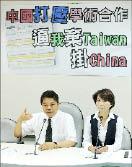Lawmakers across party lines yesterday criticized a Chinese academic for “politically bullying” a professor from National Tsing Hua University over an issue regarding Taiwan’s name.
Chinese Nationalist Party (KMT) caucus whip Chao Li-yun (趙麗雲) said the party condemned Peking University neurobiologist Rao Yi (饒毅) for insisting that Chiang Ann-shyn (江安世), director of Tsing Hua’s Brain Research Center, identify the university as being located in “Taiwan, China” in a research paper co-authored by the two.
Democratic Progressive Party Legislator Chen Ting-fei (陳亭妃) said Taiwanese scientists participating in international research are often put under pressure by their Chinese counterparts regarding Taiwan’s name.

Photo: Lo Pei-der, Taipei Times
According to Chen, it is common that when joint Taiwan-China research papers are published, Taiwan is labeled either as “part of China” or “Taiwan, China.”
She lashed out at President Ma Ying-jeou’s (馬英九) administration for its inaction over the matter, accusing it of “submitting to humiliation.”
One of Chiang’s students aided Rao’s team in conducting biomolecular research and Rao drafted a paper that included Chiang and the student as co-authors, but National Tsing Hua University was listed as being located in “Taiwan, China,” according to ScienceInsider, a Web site which specializes in news related to scientific policy.
A ScienceInsider article said Chiang told Rao that the National Science Council only allows institutions and researchers it funds to list their address as Taiwan or “Taiwan, ROC.” Chiang told Rao not to use the “Taiwan, China” name again or he would demand the removal of the Tsing Hua authors’ names from the research paper.
However, Rao wrote to National Science Council Minister Lee Lou-chuang (李羅權) earlier this week, without consulting Chiang, to say that his group was willing to drop People’s Republic of China from its address and to use “Beijing, China.”
He suggested the council should change its policy and instruct Chiang’s team to use “Taiwan, China,” saying that if the council does not make the change, it will make it “extremely difficult for Chinese scientists to co-author papers without explicitly or implicitly endorsing a Taiwan that is not a part of China.”
Lee confirmed on Monday he had received Rao’s letter, but said he ignored it.
National Science Council Deputy Minister Chen Cheng-hong (陳正宏) described Rao’s actions as “political bullying,” saying it is international practice for Taiwanese researchers use “Taiwan,” “Taiwan, ROC,” or “Taipei, Taiwan,” in papers published in international peer-reviewed journals.

Alain Robert, known as the "French Spider-Man," praised Alex Honnold as exceptionally well-prepared after the US climber completed a free solo ascent of Taipei 101 yesterday. Robert said Honnold's ascent of the 508m-tall skyscraper in just more than one-and-a-half hours without using safety ropes or equipment was a remarkable achievement. "This is my life," he said in an interview conducted in French, adding that he liked the feeling of being "on the edge of danger." The 63-year-old Frenchman climbed Taipei 101 using ropes in December 2004, taking about four hours to reach the top. On a one-to-10 scale of difficulty, Robert said Taipei 101

A preclearance service to facilitate entry for people traveling to select airports in Japan would be available from Thursday next week to Feb. 25 at Taiwan Taoyuan International Airport, Taoyuan International Airport Corp (TIAC) said on Tuesday. The service was first made available to Taiwanese travelers throughout the winter vacation of 2024 and during the Lunar New Year holiday. In addition to flights to the Japanese cities of Hakodate, Asahikawa, Akita, Sendai, Niigata, Okayama, Takamatsu, Kumamoto and Kagoshima, the service would be available to travelers to Kobe and Oita. The service can be accessed by passengers of 15 flight routes operated by

Taiwanese and US defense groups are collaborating to introduce deployable, semi-autonomous manufacturing systems for drones and components in a boost to the nation’s supply chain resilience. Taiwan’s G-Tech Optroelectronics Corp subsidiary GTOC and the US’ Aerkomm Inc on Friday announced an agreement with fellow US-based Firestorm Lab to adopt the latter’s xCell, a technology featuring 3D printers fitted in 6.1m container units. The systems enable aerial platforms and parts to be produced in high volumes from dispersed nodes capable of rapid redeployment, to minimize the risk of enemy strikes and to meet field requirements, they said. Firestorm chief technology officer Ian Muceus said

MORE FALL: An investigation into one of Xi’s key cronies, part of a broader ‘anti-corruption’ drive, indicates that he might have a deep distrust in the military, an expert said China’s latest military purge underscores systemic risks in its shift from collective leadership to sole rule under Chinese President Xi Jinping (習近平), and could disrupt its chain of command and military capabilities, a national security official said yesterday. If decisionmaking within the Chinese Communist Party has become “irrational” under one-man rule, the Taiwan Strait and the regional situation must be approached with extreme caution, given unforeseen risks, they added. The anonymous official made the remarks as China’s Central Military Commission Vice Chairman Zhang Youxia (張又俠) and Joint Staff Department Chief of Staff Liu Zhenli (劉振立) were reportedly being investigated for suspected “serious